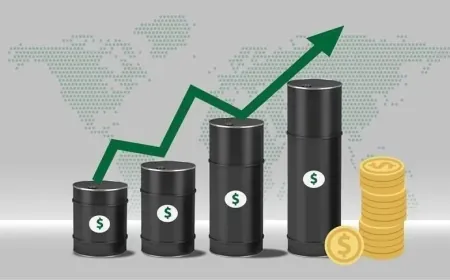Oil Prices Surge Amid Middle East Tensions and Record-Breaking Hurricane
Rising Oil Prices Due to Escalating Middle East Tensions and Strong Atlantic Hurricane

Oil prices have recently spiked to their highest levels in two months, driven by increased conflict in the Middle East and fears of a powerful hurricane season in the Atlantic.
Brent Crude is now trading close to $87 per barrel, while West Texas Intermediate (WTI) has risen above $84 per barrel. This jump in prices follows a significant rise on Monday. One major factor is the ongoing conflict in the Middle East. Israel reported that 18 of its soldiers were injured in a drone attack by Iran-backed Hezbollah, with one soldier suffering serious injuries. This has raised concerns about the potential for a larger-scale war.
At the same time, Hurricane Beryl has intensified to a category 5 storm, the highest rating on the Saffir-Simpson scale. This makes Beryl the strongest hurricane ever recorded in the Atlantic at this time of year. The hurricane has already hit Carriacou Island in the Caribbean and is now moving towards Jamaica.
The recent surge in oil prices builds on gains made last month, as OPEC+ continues to limit supply and travel increases during the summer in the northern hemisphere. Traders are also closely watching gasoline demand ahead of the US Independence Day holiday on Thursday. However, worries about a slow economic recovery in China, the world's largest crude importer, could prevent prices from rising much further.
"The escalating conflict between Israel and Hamas is increasing the risk of disruptions to oil supplies," explained analysts from ING, including Ewa Manthey. They also noted that "Hurricane Beryl has heightened concerns about a potentially severe hurricane season."
Increased trading in crude oil futures has led to higher implied volatility, with a key measure for Brent crude nearing its highest level in a month. Investors are showing renewed interest in oil and refined products like diesel, and the market remains in a bullish state, with current prices higher than future prices.
Broader Implications for the Global Market
The rise in oil prices has significant implications for the global economy. Higher oil prices can lead to increased costs for transportation and manufacturing, which can, in turn, drive up prices for a wide range of goods and services. This can contribute to inflation, which has already been a concern in many parts of the world.
Moreover, the geopolitical instability in the Middle East can have far-reaching effects. The region is a major hub for oil production, and any disruption can cause fluctuations in global supply. Countries that rely heavily on imported oil, such as those in Europe and Asia, may find themselves particularly vulnerable to these changes.
Impact on Consumers and Businesses
For consumers, rising oil prices often mean higher costs at the pump. This can reduce disposable income, as people spend more on fuel and less on other goods and services. For businesses, especially those in the transportation and logistics sectors, higher fuel costs can lead to increased operating expenses, which might be passed on to consumers in the form of higher prices.
Preparing for Future Uncertainties
Given the current volatility, both consumers and businesses should be prepared for continued fluctuations in oil prices. Energy companies might look to increase their investments in alternative energy sources to mitigate the risks associated with reliance on oil. Meanwhile, consumers can benefit from adopting more fuel-efficient practices and exploring renewable energy options where feasible.
Overall, the current situation underscores the interconnectedness of global markets and the importance of stability in major oil-producing regions. As the world continues to navigate these challenges, close monitoring of geopolitical developments and natural disasters will remain crucial for anticipating and managing economic impacts.
Also Read: Oil Prices Maintain Steady Course Ahead of Crucial US Economic Data





























































